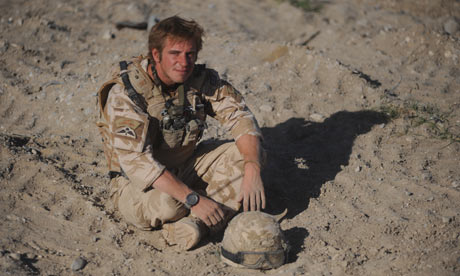-
Wednesday 9 February 2011 22.36 GMT
- Article history

A bomb disposal expert who was killed in Afghanistan on his final patrol before he was due to go on leave appeared impatient and rushed, an inquest has heard.
The day before his death, Staff Sergeant Olaf Schmid had taken a call from his stepson, who told him: "Daddy, it's time to come home now."
Colleagues paid tribute to Schmid's skill and professionalism, but said on the day he died in October 2009 he seemed to be hurrying to finish his work, and did not seem his usual self.
Schmid's death created headlines around the world after his widow, Christina, spoke emotionally about his life and the huge pressure he was under.
At the coroner's court in Truro, Cornwall, she sat through medical evidence that told how Schmid had died from blast injuries which were so severe he had to be identified from DNA recovered from his body and compared to a sample taken from his electric razor.
Christina left the inquest shortly after as members of her late husband's patrol described how Schmid, who was posthumously awarded the George Cross, had been cheerful and joking just moments before his death.
Schmid disarmed 64 IEDs before he was killed on the eve of his return as he tried to defuse a device found in an alleyway in Sangin province. The inquest heard he had unsuccessfully tried to make the device safe and died in an explosion as he returned to try again.
Corporal Thomas Stace said Schmid, 30, of the Royal Logistic Corps, had been "somewhat impatient" as he defused explosives on the day of his death.
The pressure was not imposed by army chiefs, he said. "I think it was a self-imposed pressure."
Sapper Craig Butterworth, who witnessed the death, described Schmid as a "total inspiration" – but also noticed signs of stress.
He described hearing the blast before a comrade shouted: "Oz is dead."
Butterworth said: "I was devastated and could not believe it because he was such a professional. I did not think it was possible. He was an inspiration to me."
At one point, while pulling up a suspected IED wire, he turned to a colleague and said: "Don't look at me; you did not see this," the inquest heard.
Butterworth added: "On that day it occurred to me that he was slightly rushed. I could only think that this was because it was his last day before going home for rest and recuperation."
Lance Corporal Steven Fisher suggested some of Schmid's actions on the day had been "out of character". Fisher said his colleague had been "clearly getting frustrated".
Lance Corporal Gary Parsons, who was closest to Schmid at the moment of the blast, said he thought he may have been unsettled by the call from his five-year-old stepson, Laird.
He said Schmid was working quickly because the improvised device that had been found by his patrol could have been set off at any moment by Taliban fighters. Parsons added: "Oz put pressure on himself. I think it was mostly that he was looking forward to going home. It was the last day before rest and recreation. He was his normal self and was not below standard.
"He had a conversation with his stepson and said he had said, 'Daddy, it's time to come home now.'"
Corporal Robert Nealey said Schmid was not his normal, "jovial" self.
He said: "Oz was a little impatient when we were dealing with the other devices. The rest were moving slower than normal and he was less tolerant.
"He was not his usual jovial self. I put it down to last-day jitters because we were due to return to Camp Bastion the next day in preparation for rest and recreation.
"Everyone was keen to get the job done and get back. We didn't discuss it, but I felt it was last-day jitters because we knew that a day later we would be completely safe."
Lance Corporal Philip Rogers said the blast occurred as Schmid returned to the IED that he intended to disable using a controlled explosion.
He said: "He just disappeared in a cloud of smoke and everyone started to panic."
The inquest continues.

No comments:
Post a Comment